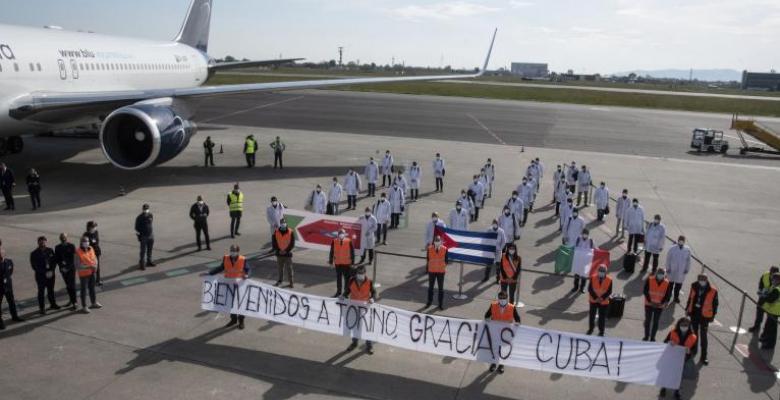A diary about solidarity
especiales

Cuba does not send its helth personnel to places in need to be on newspapers’ front pages, nor aims for recognition, or high praises…Cuba sends its doctors elsewhere just for its humanist vocation, principles, and solidarity. But the gesture itself (which some try hard to distort) needs good chroniclers. Firstly, it is paramount to appreciate those who volunteer themselves to offer their service without other interests than solidarity (Cuban professionals, who face sanitary crisis worldwide, are offended every time some people say they do it for money); secondly, people need to know about stories of friendship, collaboration, dedication…in times where merchandizing and loss of human values abound.
Enrique Ubieta —we know— is a very good chronicler and his book Diario de Turín. Solidaridad en tiempos de pandemia is now being launched by the Abril Publishing House in collaboration with Resumen Latinoamericano. Diario de Turin…is a necessary book. And it may also be a very interesting reading. With no alarmism, without any flaunting of wisdom, didacticism or Machinean approach…this is a warm reading, which “flows” full of transparency…without it meaning waving its in-depth analysis. Good journalism, transparent, acute, weighed. It is skilled and has strong base.
No one should expect that sugarcoated “chronicle” we are all —unfortunately— used to read. The emotion comes with the subject itself. Ubieta is the best witness and he is not looking to be the focus on his own book. The protagonists are the members of the medical brigade who traveled to Italy, to the cities of Turin and Crema, to work in field hospitals designed to face the Covid-19 pandemic. There was a lot to tell as each collaborator has his or her own story and they began experiencing new adventures. The challenges faced may well be excellent content for a new book. The hard times while working with avant-garde technologies, which Cubans health professionals are not used to handle and they had to learn how to handle with urgency, was a very interesting side of the story. As it was the merits of a clinical method (doctors are human beings, as their patients), which is a hallmark of Cuban health professionals.
Ubieta went beyond just anecdotes. He dug deeply into matters. He asked. He made associations. And so his book got better with a comprehensive approach of the context. To assess the impact of the Cuban medical collaboration in those cities, it was imperative to be on the field. Ubieta did not waste time on tender words (although there are some) and led a serious analysis with no double-standards, or prejudice, on the crisis unleashed by the pandemic and he noted all of it, as he was already there.
But this was not a dispassionate report, nor an “academic” text. It is book about human values and feelings, a non-fiction story, a committed testimony. Dr. Graziella Pogolotti, who lived in Turin for a while, wrote in the preface:
“Compared with the dark side of reality, a warm breath flows through Diario de Turín. Coming from the other side of the Atlantic Ocean, the Cuban collaborators rushed to help the citizens of a nation engaged in a sanitary institutional crisis and shared the risks in a race against death.”
The people in Turin rewarded the Cuban health personnel with gratitude and sympathy. The message at the Mole Antonelliana, the most emblematic building of the city, was brief, but intense: Grazie Cuba.
Translated by Sergio A. Paneque Díaz / CubaSí Translation Staff













Add new comment